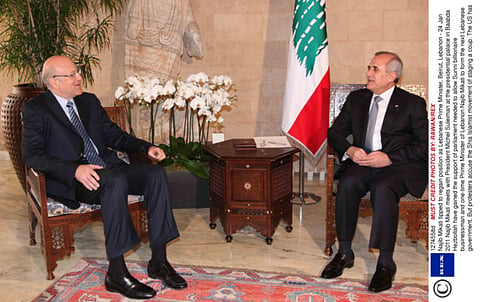Lebanon confronts unity government proposal
Renewed efforts under way to end nine-month deadlock that crippled the country

Beirut: A few days before the Special Tribunal for Lebanon (STL) convened its long-delayed trials of 5 Hezbollah men indicted for the murder of former prime minister Rafiq Hariri, renewed efforts were under way to end the nine-month government deadlock that crippled Lebanon, all to avoid fresh confrontations.
Towards that end, a series of meetings among rival forces continued, allegedly to avert the formation of a non partisan cabinet, though the major concern was how March 14 officials could participate in a unity government alongside Hezbollah-led March 8 representatives, while avowed party members were about to be tried for killing political opponents.
The trial opens in Leidschendam, Netherlands, on January 16 in absentia of alleged killers of Hariri who died in a massive 2005 Beirut bombing.
Reports circulated with claims that President Michel Sulaiman, and Prime Minister-designate Tammam Salam either completed or were about to compile an acceptable formula, now assumed to the 8-8-8 variety (8 for each group with the final 8 to benefit centrists), though few details emerged.
According to two senior officials who spoke on condition of anonymity, a deal on an all-embracing cabinet was possible, precisely because Hezbollah wished to avoid the formation of a neutral government as proposed by the head of state.
Sulaiman and Salam clinged to their non-partisan cabinet option, ostensibly to avoid a bigger vacuum ahead of the May presidential elections, though too many uncertainties remained as Hezbollah abandoned its 9-9-6 formula and maneouvered for the next best opportunity.
Details were scant though former prime minister Saad Hariri and his March-14 group asked for clarifications on several questions that could clear the way for compromises. Hariri’s chief concern was to learn whether Hezbollah was ready to announce that it intended to withdraw its militiamen from Syria and whether it was willing to forego a ministerial council statement — one of the quirks of any post Taif Accord government — that referred to the triptych “army, people, and resistance.”
There were five others concerns, including the infamous “blocking third” right, which granted Hezbollah a veto power; the so-called rotation of portfolios that saw key ministers like interior, defence, finance and energy allocated to March 14 this time around; a “pledge” to end assassinations; the acceptance that the fate of its weapons would be discussed at a future national dialogue session; and, most important, to respect its previous acquiescence to the June 2012 Baabda Declaration that defined Lebanon’s position—complete neutrality—vis-à-vis the Syrian civil war.
These were existential questions and it may well be that Hezbollah’s reactions to any of them during the course of the next few days would significantly evolve once party leaders, guided by and under full Iranian control, concluded that compromises were warranted.
Hezbollah’s greatest fear with a neutral government, even if failed to gain parliamentary approval that would then transform it into a caretaker government to replace the current one, was to stand in for the President of the Republic after Sulaiman left office.
Equally important was the apprehension over the STL’s work, as Rafik Hariri’s ghost returned to haunt the body politic, further separating the existing gulf among Lebanon’s competitors.
Sign up for the Daily Briefing
Get the latest news and updates straight to your inbox



